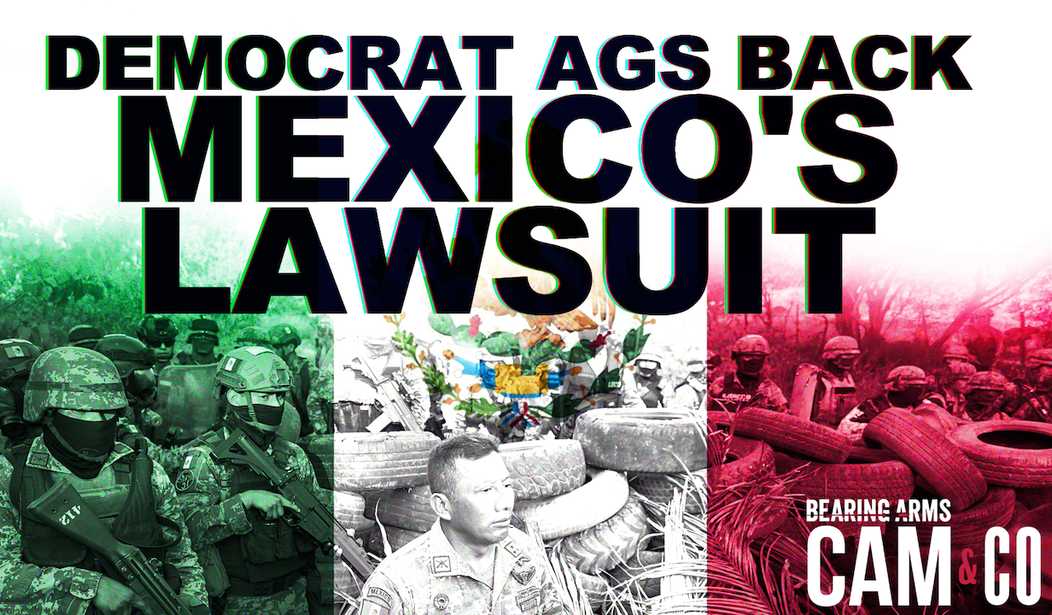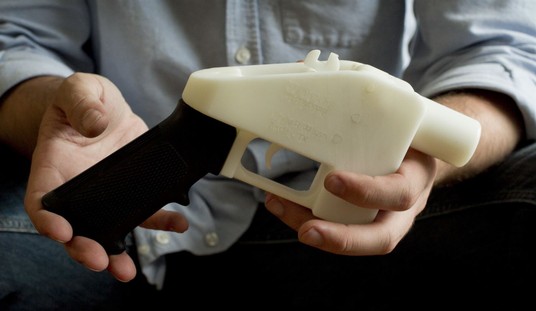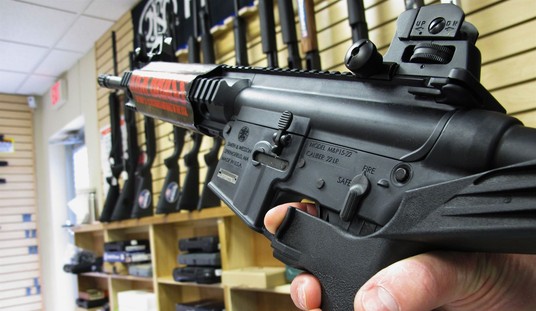A number of blue state attorneys general are siding with Mexico in that country’s $10-billion lawsuit against more than a dozen major gun makers that accuses the firearms industry of willfully arming drug cartels and fueling arms trafficking south of the border. Thirteen AGs, all Democrats, filed an amicus brief in support of the lawsuit in U.S. District Court on Monday and urging the court not to dismiss the lawsuit.
The brief, authored by Massachusetts AG Maura Healey’s office, argues that Mexico’s lawsuit against the firearms industry isn’t precluded by the federal Protection of Lawful Commerce in Arms Act, though much of the brief is taken up in arguing against the constitutionality of the PLCAA itself, which has been repeatedly upheld by the courts since it was enacted in 2005. Just one court in the country has determined that the PLCAA is unlawful, and that decision was vacated by the Pennsylvania Superior Court last year (an en banc panel reviewing the court’s original decision heard oral arguments last August, but has yet to release its opinion), but that’s not stopping the anti-gun AGs from trying to make their own case against the law’s constitutionality.
The problem for the plaintiffs in this case is that the PLCAA was meant to deal with precisely this kind of junk lawsuit that seeks to blame gun makers for the third party actions of criminals; in this case multi-national criminal enterprises with profits that run to the billions of dollars each year. That money not only provides the cartels with whatever firepower they wish to acquire (including bomb equipped drones and rocket-propelled grenades not found in U.S. gun stores), but it funds corruption and graft throughout every layer of government in Mexico from village mayors to the federal government.
And while the current administration in Mexico would prefer to lay the blame for cartel violence at the feet of the U.S. firearms industry, for many living in communities under cartel control, the government of Andrés Manuel López Obrador has only made things worse.
A small squad of soldiers with about a half-dozen trucks and sandbag emplacements stands guard on a rural highway in western Mexico. In one direction, almost within earshot, one drug cartel operates a roadblock extorting farmers. In the other direction, a rival cartel carries out armed patrols in trucks bearing its initials.
The Mexican army has largely stopped fighting drug cartels here, instead soldiers guard the dividing lines between gang territories so they won’t invade each other’s turf – and turn a blind eye to the cartels’ illegal activities just a few hundred yards away.
At the first roadblock, set up by the Viagras gang that has long dominated the state of Michoacán, a truck stands parked across the highway and stacked sandbags protect cartel gunmen.
Every few hours, the gunmen roll back the truck to allow farmers through, but only let through the drivers once they have paid a “toll”.
About 3km (2 miles) down the same road, another cartel’s territory begins, marked by squads of armed men and primitive homemade armored trucks bearing the letters “CJNG” – Spanish initials for the Jalisco New Generation cartel.
Between them stand the soldiers, doing very little at all.
This “non-aggression pact”, as one security analyst called it, isn’t stopping the cartel violence. In fact, it’s served to enrage some residents in Jalisco New Generation territory, who accuse the AMLO administration of playing favorites. Over the weekend, Mexican army patrols in the town of Lomas Blancas, which is controlled by the Jalisco cartel, were attacked by civilians and cartel members a day after the military allegedly opened fire on protesters.
The army accused townspeople of acting as the “social base” for the Jalisco drug cartel, which has been trying to make inroads into Michoacan. Soldiers detained six protesters and nine suspected cartel members while confiscating nine rifles and tactical gear with Jalisco cartel logos, the army said.
The clash occurred in an area where the Jalisco cartel is fighting a bloody turf war with gangs from Michoacan. The two sides have used trenches, sharpshooters, and bombs dropped by drones in battling each other. Increasingly, civilians have found themselves on the front lines of the fighting.
The main incident involved protesters from the Jalisco-dominated town of Lomas Blancas. They say their anger stems from what they see as government policy favouring the Michoacan-based Viagras cartel. The Jalisco cartel has encouraged – some say forced – people to join the protests.
Soldiers are in a difficult position in Michoacan. The government strategy has been to repel attempts by the Jalisco cartel to gain territory in the state, but do little or nothing about the Viagras, who set up roadblocks to extort money from residents.
Soldiers have apparently been ordered just to keep rival cartels apart, but that angers townspeople in Jalisco-dominated towns such as Loma Blanca because soldiers do not prevent the Viagras from operating.
This is somehow the fault of U.S. gun makers? Give me a break.
I’m no lawyer, but it seems to me that the Mexican government’s response (or lack thereof) to the cartel violence is itself a major driver of violence south of the border. The same cartels that are waging war against each other (and the Mexican government) are also operating here in the United States, but we don’t see the same type of large-scale violence here that we do in Mexico. It seems to me that if access to American guns were the only thing responsible for cartel violence, we’d be seeing the same type of attacks here on U.S. soil. And yet, even in border cities like El Paso, the violent crime rate is far lower than it is just across the border in Juarez. Last year there were more than 1,400 homicides in Juarez, compared to about 30 in El Paso.
If the availability of firearms was the driving force behind the cartel violence, you’d expect El Paso to be an even more dangerous city than its neighbor across the border, and clearly that’s not the case. I’d argue that government corruption in Mexico has far more to do with the staggering amount of cartel violence than legal U.S. gun sales. Despite the claims of blue state Democrats, Mexico’s lawsuit is an attempt to pass the blame onto firearms manufacturers, when it should be taking the fight to the cartels themselves.









Join the conversation as a VIP Member